Blog Archives
‘An Enemy of the People’ Brilliant, Drop Dead Tragicomedy With Jeremy Strong, Michael Imperioli
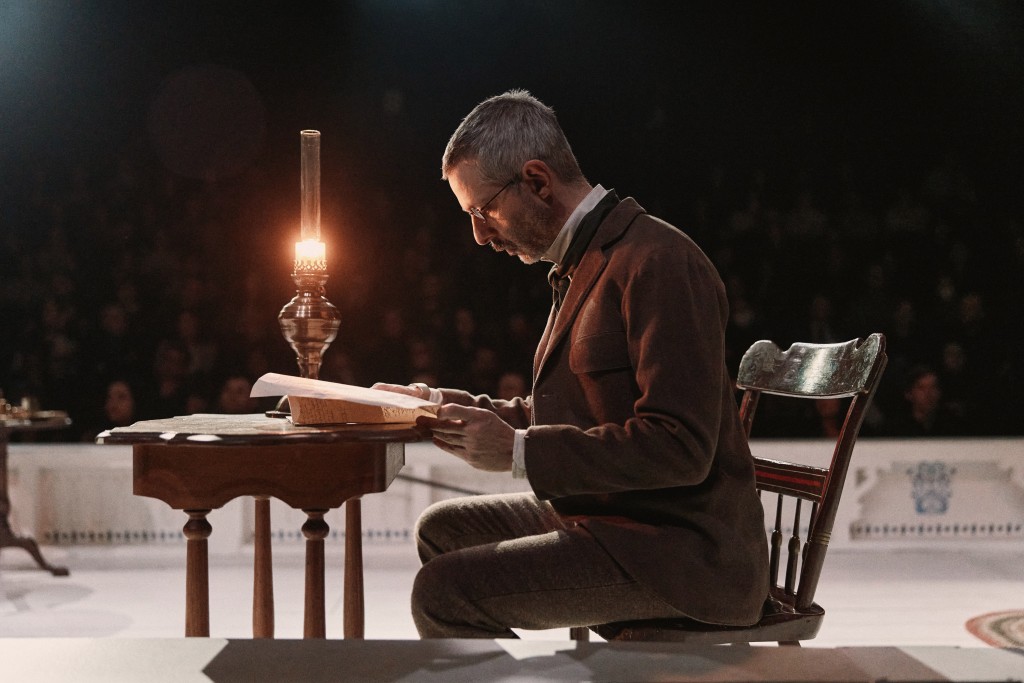
In Amy Herzog’s adaptation of Ibsen’s sardonic An Enemy of the People, currently at Circle in the Square for a limited engagement, we are treated to a modernized version of a work whose timeless verities ring true for us today. Aptly directed by Sam Gold (A Doll’s House Part 2), Jeremy Strong (TV: “Succession”) as Dr. Thomas Stockmann and, Michael Imperioli (TV: “White Lotus”) as his brother, Peter Stockmann, go head to head about a subject that should concern every politician and citizen on the planet: clean, potable water.
In adequately slimming down Ibsen’s five act play to highlight important themes that are taken out of our current headlines, Amy Herzog confirms her penchant for adaptation. Successful with the process of refining, to trim the salient dialogue and concepts of a classic work, Herzog’s minimalist adaptation of A Doll’s House was nominated for a Tony Award. Likewise for An Enemy of the People, Herzog tames the unwieldy Ibsen sentence construction and vocabulary (sometimes hampered by translation from the Norwegian), so its clarification provides accessible, trenchant, stark meaning with a greater impact than the work may have had in an original translation.
Other changes in characterization compact the play’s crystalline focus. Conjoining two characters (Petra and Mrs. Stockmann) into just daughter Petra (Victoria Pedretti), Herzog humanizes Dr. Stockmann, who misses his dead wife, and is gratified that his remaining family is close and supports him. Reinforcing Petra’s identification with her father, Herzog intensifies Stockmann’s dilemma and persecution which becomes Petra’s problem as well. So we appreciate her defense of her father and courage in braving the victimization and town’s retribution after the doctor attempts to save the town from itself by blowing the whistle about a nearby spa’s contaminated water supply.

Herzog emphasizes the situation and brings it rapidly to a crescendo. It begins with acknowledgement of Stockmann’s heroism by his friends. The fine scientist and researcher sends the nearby resort’s water sample to the university lab which affirms disease-causing, killing bacteria in the water. In Europe those who would visit spas for treatment, sometimes would “take the waters,” meaning drink the waters for their reputed, curative healing effects. Stockmann has discovered that if the patrons sip the “healing” waters, the tourists will become deathly ill. If they bathe in it, perhaps the polluted water won’t be as immediately disastrous, but it will be dangerous. This is Ibsen at his sardonic best and the message is meaningful for us today, (water damaged by PCBs, microplastics, hormone disruptive contaminants). Though Ibsen wrote the play over 140 years ago, little seems to have changed.
When Stockmann’s more liberal friends, newspaper editor Hovstad (Caleb Eberhardt), his assistant, Billing (Matthew August Jeffers), and even Aslaksen, Chair of the Property Owner’s Association and printer (Thomas Jay Ryan), hear of Stockmann’s prescient action, they deem him to be heroic in “saving” the town. During their discussion we find out that both Hovstad and Billing resent the wealthier investors having come from impoverished backgrounds; they encourage the doctor to publish the report. Additionally, Aslaksen, wants to hold a dinner party and present Stockmann with a small award. Aslaksen, a self-declared “man of moderation” says, “nothing too flashy, we don’t want to ruffle any feathers.
To complicate the situation, Stockmann’s father-in-law, Morten Kiil (David Patrick Kelly), who is still alive and a wealthy man, owned one of a number of tanneries near the spa area. Apparently, Kiil and the other tannery owners “forgot” to properly dispose of the chemical runoff used to cure the hides and the poisons have seeped into the water table. (Think of Jonathan Harr’s book and adapted film A Civil Action, about the pollution of the Woburn, Massachusetts water supply that sickened and killed children and families.).
Petra reminds her father that he suggested before the construction of the resort that they make adjustments for such a possibility because Stockmann feared the tannery’s proximity. However, his brother, Peter (the town mayor), the investors and officials shot down the doctor’s idea because of additional cost and delay. Their wants were understandable; the sooner they opened the resort and spa to make money and bring tourists in droves to the town, the better. Indeed, the town, in anticipation of the spa’s opening in the summer has grown more prosperous and the people are looking forward to servicing the tourist trade that the spa will bring.
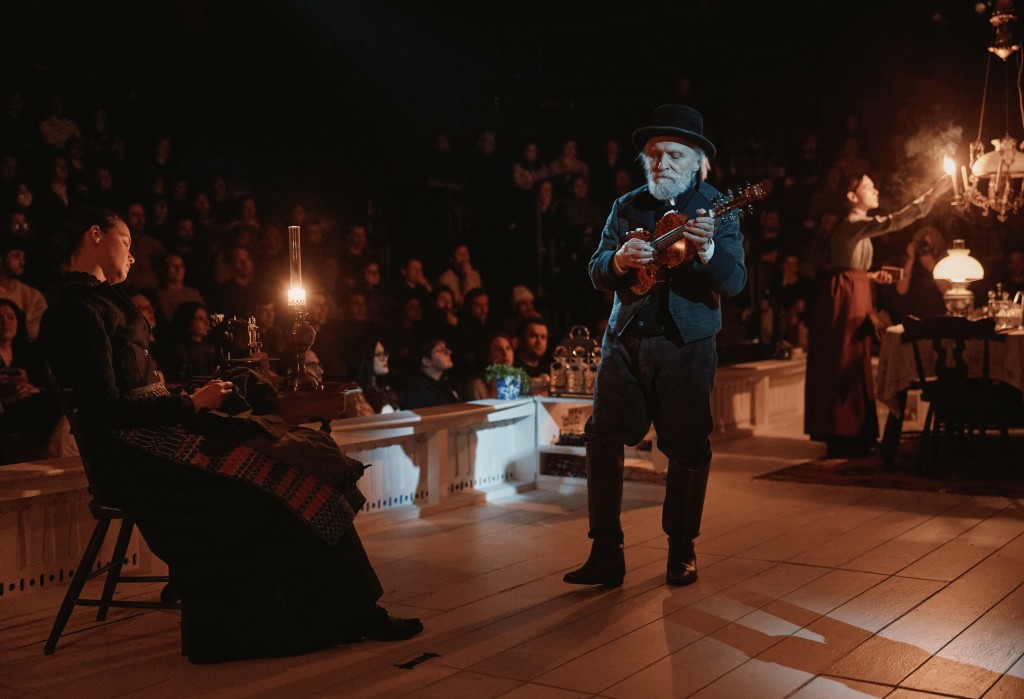
Clearly, money “trumps” the viability and security of the spa. Stockmann’s science and the safety and sanctity of human life are in bondage to financials and commercialism. The developments that follow after Stockmann receives the lab report hang in the balance. Will his boss and brother, the mayor and investors agree that the situation warrants rehabilitation of the baths, though that might jeopardize the town’s commercial viability? Or will the mayor and investors hold the line that the spa and resort be opened and celebrated, despite the potential harm to come? In other words should the truth be exposed or covered up?
The brothers are on opposite sides of the dilemma; one represents science, the other the town’s economic prosperity. A critical factor is that Peter is Thomas’ boss and Thomas answers to him. As Dr. Stockmann lives for his work, so does his brother Peter, who has never married and demonstrates overweening pride as the mayor servicing the richest, most prosperous citizens. If they were at odds with each other before, with Peter ignoring his brother’s scientific suggestions and criticism of his “liberal” newspaper friends, their conflict explodes after the doctor confronts Peter with the report.
Unfortunately, the doctor’s idealism and self-righteousness has blinded him, as Peter’s greed, self-importance and his rich friends sway him beyond human decency. Peter appears to hold all the chips in this poker game. Their struggle is an iconic one and Gold’s direction and Strong and Imperioli’s acting are on-point superb during their interactions and arguments and especially at the town meeting.
Of the doctor’s three friends, Aslaksen is the one who anticipates that various townsfolk may not perceive Stockmann as a hero. And indeed, when the mayor reads Stockmann’s report, he takes it personally as an attack based on resentments stemming from their childhood. Beholden to wealthy interests, Peter actively dismisses the gravitas of what Thomas suggests and refers to his brother’s pronouncements as “speculation and wishful thinking,” and he insists the doctor’s attitude is “spiteful and childish” for cutting off the town’s “only” source of income.
From his perspective the proof screams at Thomas about how dire the situation is. Thus, the doctor expects his brother to retrofit the baths and delay the opening of the spa, though he has not researched the practicality of how long it will take and how much it will cost. The situation can be mitigated if the two sides agree to tackle the problem rationally and intelligently. However, both brothers cast it as an either or situation and Peter is predisposed to cover up the noxious, infernal truth and proceed with the spa’s poisoned-filled opening.
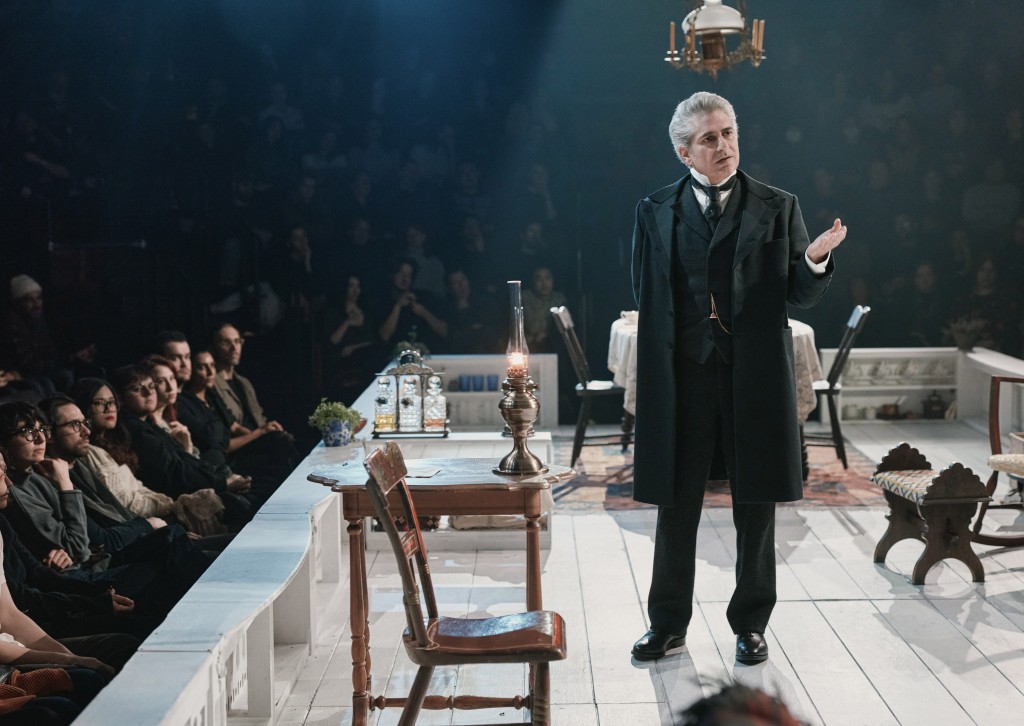
The genius of An Enemy of the People is the way in which the situation and character interactions reveal social and personal dilemmas. Do we uplift human rights supporting the sanctity of life and security for all as the doctor does? Or are rights subject to economic and class background and curtailed accordingly, as Peter wishes? Are we generous and life-supporting or selfish and nihilistic? Are those with money truly superior or is their arrogant, self-importance riddled with flaws because to value money and power over human life is suicidal folly that leads to catastrophic, karmic consequences?
In this play, Ibsen reveals the perniciousness of toadying to class and money at the expense of life and health. And so it goes with Peter, the mayor, who bows to special interests despite the apocalyptic moral imperative that the spa will kill instead of heal. According to the mayor, the cost and delay will bankrupt the town. He manipulates and threatens Thomas’ friends Hovstad, Billing and Aslaksen so that they turn against Thomas to “save” the town from the financial debacle that will occur if the spa closes.
As forces converge against Thomas, and his friends who once stood by him back away from his facts, we note that financial viability is the only consideration, when it doesn’t have to be. The arguments given settle in the “benefit” to the town’s prosperity which will be destroyed if they take two years to retrofit the spa. The spa supporters affirm that surrounding towns will jump in the gap and create their own resorts and wipe them out competitively by the time they finish their corrections. If they cover up the truth, at least the town will prosper commercially and the investors will receive an immediate return on the investments.
In their arguments, not one of the spa supporters, Stockmann’s friends or the mayor consider that tourist deaths and subsequent lawsuits could force the town into bankruptcy. Even worse, the scandal of a cover-up and eventual publicized expose will necessitate investigations and the public humiliation and outcry that such was allowed by the mayor, etc., destroy the town’s reputation and revenue for a long time to come. The gaslighting notion that the doctor’s facts are “speculation” is actually the fantasy (“wishful thinking”) that the bacteria and poisons in the water are not harmful and/or don’t exist. The investors, town and mayor are “damned if they do, and damned if they don’t.”
Rather than correct their attitude and behavior, Peter and his supporters double down on their initial dereliction in not following the doctor’s suggestions. They turn on him blaming him for the situation which they negligently in a criminal dereliction of duty refuse to believe and act on.
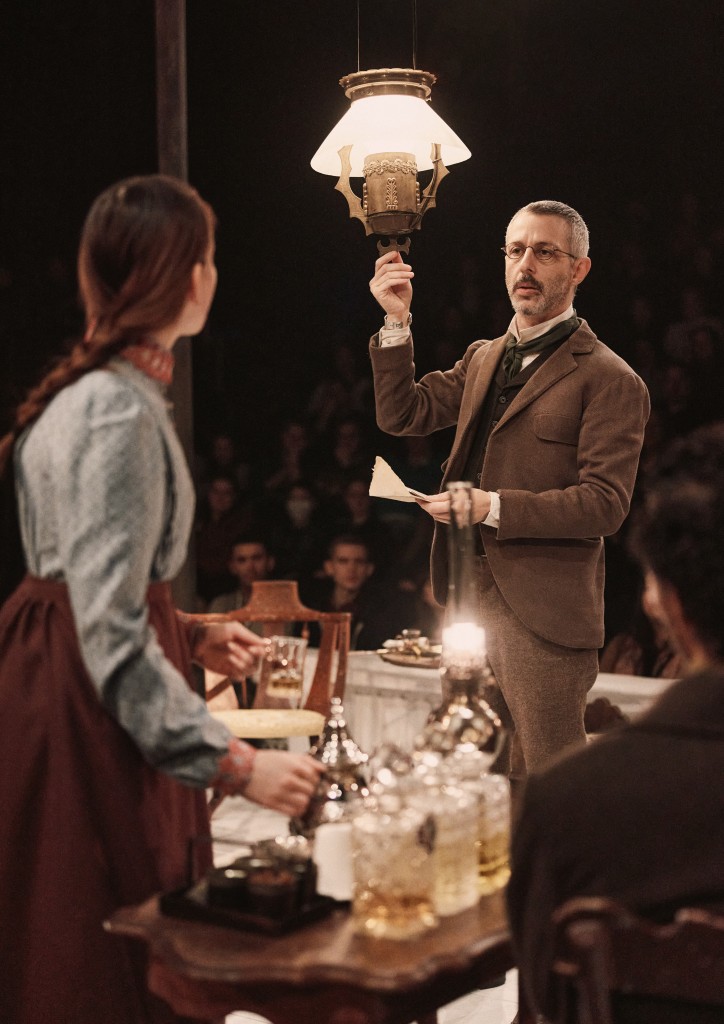
Strong’s doctor gives an impassioned speech to Peter, Hovstad, Aslaksen and Billing. He prophesies that he will present the truth at a general meeting and save lives regardless of their position not to publish the report. The town should be able to hear and decide the best path to take. At the end of his arguments with Aslaksen, his brother and the others he states, “I have faith in the people of this town. You can fire me, you can shun me. But you can’t stop me from telling the people the truth.” Strong’s performance is authentic; we believe him and hope with him. It is a superbly unforgettable dramatic moment.
It is also an excellent place to create “the pause” (not an intermission), which lasts five minutes, then segues into the town meeting where Stockmann presents the report. The playing area is converted from Dr. Stockmann’s atmospherically lit house and study, into a well-lighted bar where drinks (aquavitae) are served to the audience. Gold has dynamically staged this segment so that audience and actors mingle and imbibe for the five-minute interval. The atmospheric lighting of the first half of the production with gorgeous antique lamps from that period is replaced during this “pause”. The theater’s regular lighting is turned on as the drinks are served. It stays on, then, as the town meeting gets underway, and the play resumes with lights down, Dr. Stockmann confronts the mayor, his former friends and the townspeople.
This is genius staging because during the “pause,” Gold moves us from the past to the present in a time meld, and we are reminded of the currency of this play’s situation and themes.
Then the town meeting ensues. It is terrifying and fascinating. The mayor, Hovstad and others shut the doctor down with loud verbal muscling. When Thomas stands up to them speaking the truth, whipped up by the mayor and others, the townspeople repeat the others’ refrain that Thomas is “an enemy of the people,” and physically beat him. Strong’s performance and the ensemble’s counter-performances are incredible.
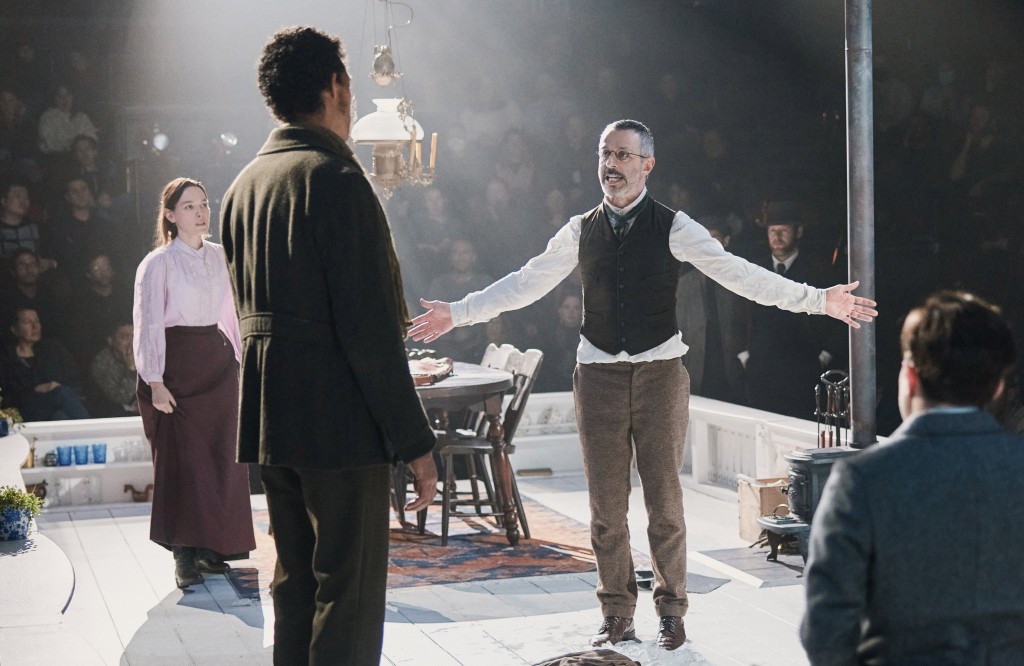
As we stand in the doctor’s shoes, we identify with his untenable situation which is beyond irony. This is especially so after he is pummeled with buckets of ice (the symbolic equivalent of a stoning) thrown on top of his head. Strong’s Stockmann rips off his shirt and offers his life for them if only they would accept the truth. The irony is complete. The townspeople and his brother want their fantasy. His life and their own lives are worth nothing. Money is everything. They believe that the spa will bring prosperity and money though they may not live to see it. They can’t handle Thomas’ “facts.”
We have seen this picture played out before in the COVID political botch job of the former president, who, like Peter the mayor, eradicated the deadliness of the virus with his lies and misdirection, as the US charts the largest number of COVID deaths globally to date; yes, people are still getting COVID and dying from it. The townspeople’s rejection of Stockmann’s facts hyped up by the mayor and his cohorts parallel MAGA’S convenient rejection of the truth for “alternate” facts (conspiracy theories) which they rabidly cling to in a morbidly cultish intractability whipped up by MAGA politicians. Then as now, science is rejected by those who wear their lack of education and ignorance on their sleeves, as the facts become others’ “wishful thinking.”
What is particularly ironic about seeing this production is the extended parallel of censorship then and now but differently processed. Ibsen never imagined media, social media and AI. Instead, of publishing Thomas’ factual report, the town paper is silent about the danger, censoring the report. Today, lies are broadcast on various media platforms including “Truth Social” precisely to extinguish the credibility of facts. The loudness and cacophony of wrong information and falsehoods deafen those willingly, lazily duped into a conspiracy of complacent trust. Those who would not be duped must read extensively to separate truth from lies and silence the cacophony to tease out what is really happening.
Do we laugh or cry? My response to Strong’s impassioned speeches after his beating and vilification was panic laughter and a few tears at the enormity of witnessing the play’s themes which resonated for me as an anti-MAGA who watched Republican truth-tellers like Liz Cheney, the former president’s Republican administration witnesses at the January 6th Commission, Dr. Fauci, former Governor Andrew Cuomo, and a legion of others who stood and still stand for the truth against the fraudulent former president. For their pleas of truth, they, like Strong’s Stockmann, have been symbolically crucified, character assassinated, demeaned, defamed and threatened with death. The dark ironies of this production are drop dead tragicomedy that is nonpareil in today’s theater.
And as such, this production is a warning. The message for me was “not on my watch!”
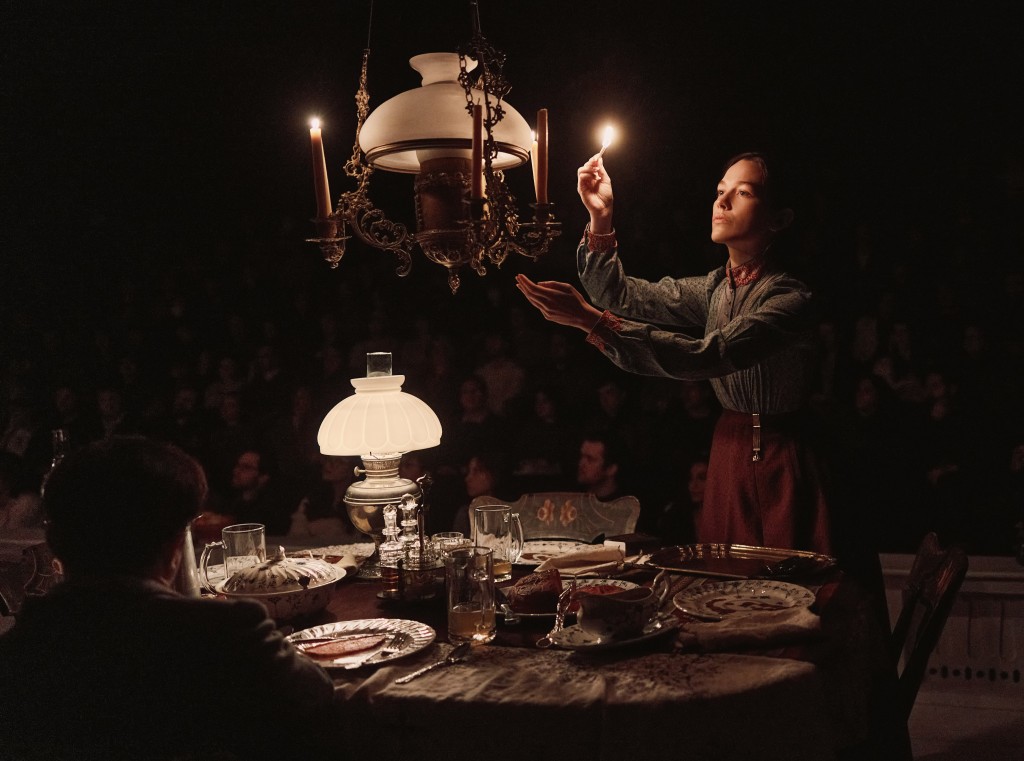
There are those who deny and punish truth tellers, whether scientists or Cassandras. Indeed, the more the leaders and their followers cry for blood, it would seem that the greater the confirmation that what is being said that inflames them is accurate. The final twist in this magnificent work which Herzog, Gold and the phenomenal actors have made as plain as day, you will have to see for yourself, if you can get a ticket. The conclusion just might involve a rescue by Captain Horster (Alan Trong), keen on Petra, who offers to take Stockmann, Petra and Stockmann’s son to America. Why? It is better there and the citizens are more amenable to hearing the truth. The audience laughter was as bitter as the dark irony inherent in Captain Horster’s innocent comment.
Re-imagining An Enemy of the People, Herzog, Gold and the creative team have delivered a searing, terrifying and at times humorous work that will remain in one’s consciousness long after one leaves the Circle in the Square. From the imaginatively stylized, technically galvanizing and evocative set design by dots, to the superbly thematic lighting design by Isabella Byrd, the period costume design by David Zinn, and Campbell Young Associates hair and wig design, the director’s vision coheres powerfully.
The singing of Norwegian folk ballads throughout is an additional atmospheric element that establishes setting and grounds us in history. Norway is a place that is often presented as more forward thinking than the US, another irony. Human nature is similar everywhere, especially when ignorance can be manipulated for profit and the illusion of prosperity for the poor, which rarely happens. Mikaal Sulaiman’s sound design helps to convey the timber of the music and voices. It might have been interesting to see a translation of their lyrics in the program.
An Enemy of the People is in a 16 week limited engagement that ends June 16. It is two hours with a five minute pause and no intermission. Circle in the Square, 235 West 50th St. between 7th and 8th. See it for its performances, the fine direction and inspired re-imagining. https://anenemyofthepeopleplay.com/
‘The Comeuppance,’ a Pre-Reunion Reunion of Five Friends and Death, Theater Review

In The Comeuppance by Branden Jacobs-Jenkins, directed by Eric Ting, old friends meet for a pre-reunion reunion at the home of Ursula (the superb Britney Bradford), who has organized a party to celebrate before she sends off friends to their twentieth reunion. In an extension of its World Premiere at the Signature Theatre, the comedy with somber, stark elements was extended until July 9th by popular demand.
Jacobs-Jenkins’ (Appropriate, An Octoroon) themes are timely. The ensemble was spot-on authentic and natural. In his two hour play with no intermission millennials admit the consequences of living with unsound decisions made in the less scrupulous years of their youth. Sooner or later, there is a “comeuppance.” One cannot escape the inevitability of oneself and one’s mortality, as Death, who like a sylph inhabits each of the characters, periodically reminds us.
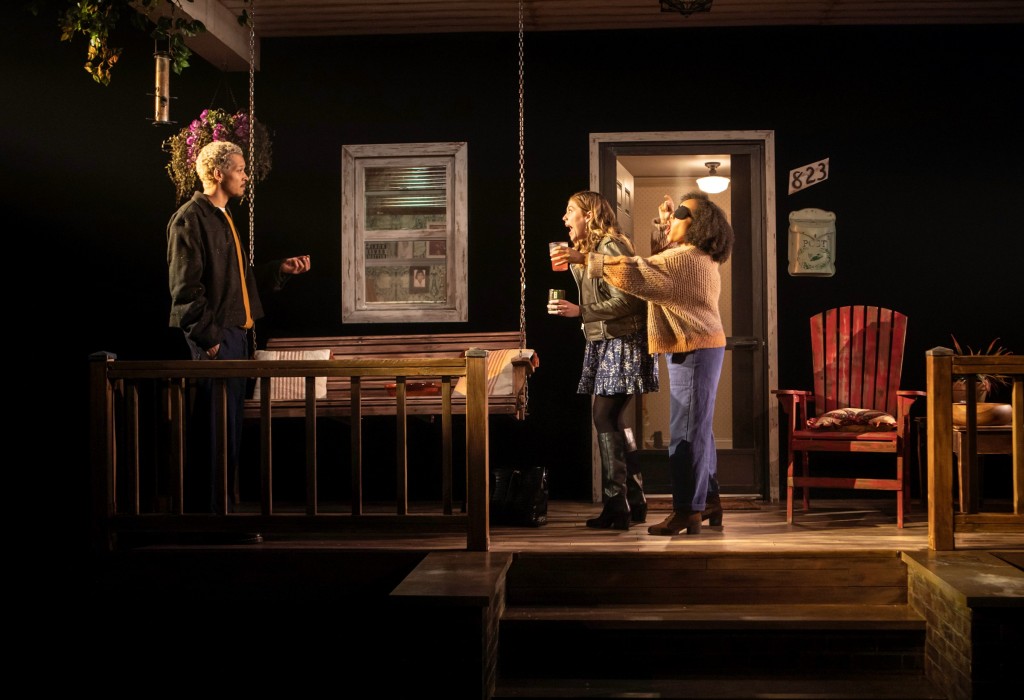
To effect this principle theme of death in life and the transience of all things, Jacobs-Jenkins places thirty-somethings in a backyard with drinks, weed and a loaded, shared past. They once were part of a high school friend group called M.E.R.G.E.: Multi Ethnic Reject Group. Jacobs-Jenkins allows them to go at each other (Emilio’s bitterness is apparent), as they bond over a perceived closeness, which may not have existed after all.
But first, Death introduces himself after slipping into the soul of the protagonist Emilio (Caleb Eberhardt), who has the most difficult time struggling to let the past remain in the past so he can create a better life for himself. As he does with all the characters, Death speaks through Emilio. He warns the audience he is always lurking in omnipotence, with a complete understanding of who human beings are, including the audience members, which he crudely, fearfully reminds us of, once more at the conclusion.

Since last they met, Emilio, Caitlin (Susannah Flood), Paco (Bobby Moreno) and Kristina (Shannon Tyo) have established careers, been to war, gotten married and had kids. Each in their own way has confronted loss, confusion, cultural chaos and most recently COVID-19. We learn that all have been under an emotional siege. Some are sustaining the sociopolitical chaos that Emilio points out better than others, as they either ignore it, reflect upon it, or allow their own lives and difficulties to blot it out of their consideration.
Interestingly, the generous Ursula, whose home, inherited after her grandmother’s death, has been offered up for the celebration, becomes the first to manifest the ravages of millennial time and aging. She has lost her sight in one eye, having contracted diabetes. She tells the others that she is not up to going to the reunion and they may stay as long as they like at her party.
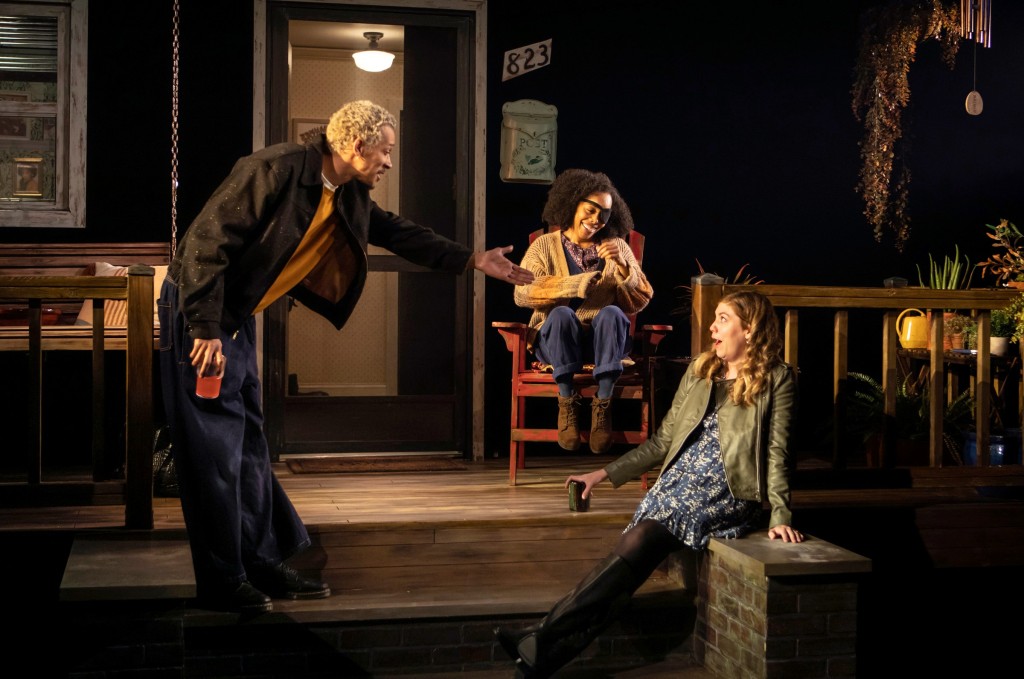
As Emilio, Caitlin and Ursula wait for the others, Emilio’s irritability spills out in humor against Caitlin, whom he once dated in high school. She has married an older man who is a Trumper, which upsets Emilio. Their two children her husband has from a first marriage appear to be doing well: one is finishing college, the other is beginning a career. Thanks to the actors who present their characters with moment, as the characters cath up their lives, the segment never completely falls into tedium. The characters reacquaint as they step into familiarity with Ursula reminding them of M.E.R.G.E codes they used in high school.
During this segment Death manifests a presence in the monologues from Ursula and Caitlin. They heighten their soul revelations and reflect another aspect of their ethos that is not apparent on the surface.
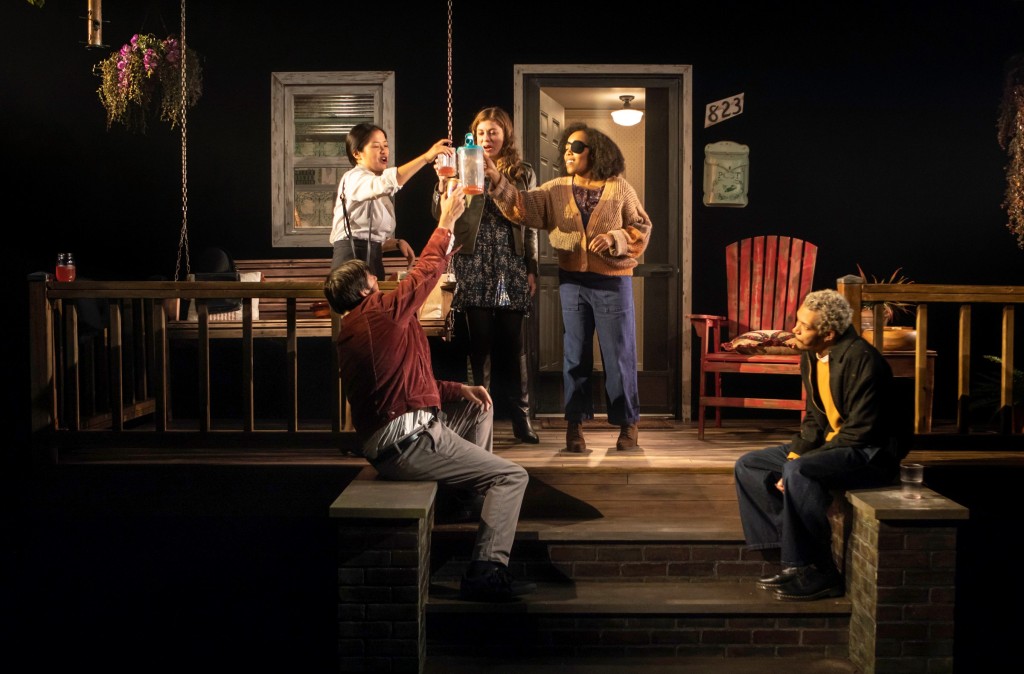
When Kristina, a doctor with “so many kids” arrives bringing her cousin Paco, who once dated Caitlin and treated her badly, the hilarity increases. It is driven to its peak with the characters’ fronting as a means of getting their “land legs” with each other. By this point the drinks and weed have kicked in and Emilio confronts Paco. whom he clearly distrusts and despises. More revelations erupt and we note Paco’s and Kristina’s individual unhappiness. Once again, Death inhabits Kristina and Paco and expresses their soul’s interior.
Throughout the play Jacob-Jenkins contrasts the material realm and the illusory fitted by human delusion that these individuals have “all the time in creation” to live their lives against the immutable truth of life’s impermanence. Speaking with quietude and without passion, Death assures us he “has their number.” He matter-of-factly reminds us that entropy is king. Things fall apart; human bodies, human relationships, all we hold dear is smothered in half-truths and lies, for we die.

Then the limo arrives and with it well-worked confusion. Ursula goes off to the reunion that Emilio never attends. With the door locked against him and all his buddies gone, he sleeps on the porch, a hapless, solitary and alone soul who needs to “get himself together” emotionally, expiate the past and forgive himself for his failings.
When Ursula returns, we learn the extent of the lies of omission as Eberhardt’s Emilio allows the truth to flow and Ursula shares with him what she couldn’t reveal before. Then Death through Emilio takes his final “comeuppance.” While she “sleeps in her mind” he expresses that his target is Ursula in the immediate future. He discusses that how she will end up is exactly as her friend Caitlin fears. Despite Emilio’s offering to marry and take care of her, Ursula puts him off because she has someone. It turns out, it’s another poor decision for both of them.
Branden Jacobs-Jenkins has woven an interesting conceptual piece that is uneven especially in segments where there is too much ancillary discussion by characters. There is an overabundance of unnecessary detail that impede the forward momentum of the dynamic that occurs on the porch of their lives. In these sections, I dropped out. Perhaps wise editing would make the segments more vital and immediate.
Nevertheless, the actors are terrific. They make the most of the unevenness that drives the play toward the characters’ acknowledgement of duality: of experiencing life and watching and reflecting oneself living it in the knowledge that they are mortal.
The difficulty of this duality is dealing with the reality of Death. In the play it is animated through the characters for our benefit. However, in their lives, it is ever-present in the form of gun massacres, the war in Iraq and Afghanistan, political subterfuge and sabotage in January 6th which attempted to signal in the “death” of our democracy. All of these, Death’s cultural possessions, have brought the characters’ millennial generation to the brink, Emilio acknowledges. That and their body’s frailty is their comeuppance, Ursula suggests.
Though each generation has had its cataclysms, it is the millennials “no way out” that Emilio especially confronts while the others seem to ignore it, save Ursula. Unfortunately, our culture doesn’t do death well and entertainment capitalizes on its particularly gruesome features in the proliferation of horror stories and films. Jacobs-Jenkins counters this aspect, making it a homely creation of back porches. And as he reminds us no one “gets out alive,” at least there is humor. We can laugh on our way out of life’s conundrums, miseries toward Death’s grasp.
Look for this play to be produced elsewhere. And check out their website for more information at https://signaturetheatre.org/